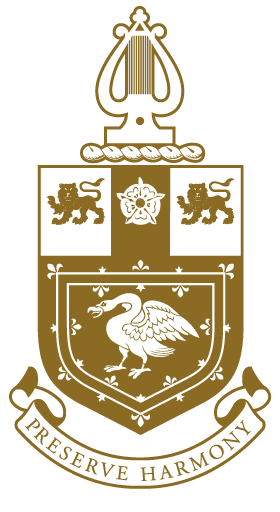Young Artist Interview: Connor Fogel’s year with Shakespeare, Liszt, and other characters
If music be the food of love, play on…
Connor Fogel’s year with Shakespeare, Liszt, and other characters
Conducting the music for The Royal Shakespeare Company was probably the last way I expected to bring the decade to a close. I studied as a classical concert pianist with a masters in conducting musical theatre, and prior to my higher education, a childhood in the poverty stricken South Wales valleys did not exactly burst with refinement. Shakespeare? Me? Really? Yet here we are; entering the 2020s with pearls in my periwig and pantaloon in tow.
Prior to life at the RSC, my tastes and interests were a mixed bag. Whilst studying piano at The Royal Welsh College of Music and Drama I was a thoroughly average pianist and was anticipating any future that did not include the piano. Becoming a famous rock star seemed like a realistic career aspiration, although this was scrapped in favour of musical theatre where I spent much of my free time working with local amateur dramatic companies. Luckily my fervour for the piano had reignited itself by the end of my degree, but I had already applied to do a masters in musical direction, and a masters in the piano was not a possibility. Any career as a pianist would now have to be a passion project and not an inevitability, something which would prove very productive.
Shakespeare and I crossed paths during my masters at Mountview Academy of Theatre Arts (generously funded by the Worshipful Company of Musicians). I had been asked to arrange 80s power ballads in a Renaissance style for a production of A Midsummer Night’s Dream. I had no idea what I was doing, but they sounded pretty and I enjoyed the play. During my masters my passion for classical piano music grew exponentially. Suddenly there was no pressure, no exams, just the love of the music. Franz Liszt quickly became a passion, nearing on obsession that continues to this day. Liszt’s music is full of everything I love in music – drama, theatricality, melody, and unprecedentedly modern harmonies. I spent most of my free time preparing for an imaginary Liszt recital, that would not come to fruition for another three years.
After a year as associate head of music at The Royal Central School of Speech and Drama, and a year of small fringe shows and cabaret, I made my West End debut as musical director in 2019, of a seven week run of the musical Queen of the Mist at the Charing Cross Theatre. The book, music and lyrics were written by American composer Michael John LaChiusa, who had stormed the 2000 Tony Awards with several nominations for his musicals The Wild Party and Marie Christine. Queen of the Mist, written in 2011, tells the bizarre and surprisingly moving true story of Anna Edson Taylor: an elderly lady who in an attempt to gain fame and fortune in her twilight years became the first woman to go over Niagara Falls in a barrel, and survive. The sweeping, orchestral score is stunning, and LaChiusa is one of the few genuinely interesting and unfathomably talented composers working in theatre at the moment. Shortly before previews began, after leaving one of our rehearsals, a man in a leather jacket with bleach blonde hair stood at the theatre entrance looking excited and asking questions. “Hi I’m Connor, I’m conducting the show”, I tell him. The man bowed to me and kissed my hand. “Oh darling, you’re the most important person here!”, he exclaimed, in a broad New York accent. “I’m Michael John, I wrote the show.” He attended several performances, greeting me after each show with advice, anecdotes and an inimitable sense of humour. There are few things in life more frightening and thrilling than performing a work to its creator, and his presence during the shows was a wonderful gift that I’m unlikely to forget.
During the rehearsals for Queen of the Mist I had still been frantically practising Liszt during tea breaks. I had managed to acquire two recitals, one at St Lawrence Jewry (which would be my London debut as a concert pianist), and one at Hampton Court a few weeks later – both made possible by the Worshipful Company of Musicians. The initial recital was surreal and exciting, empowering and exhausting; performing two of Liszt’s great religious works – Bénédiction de Dieu dans la Solitude and Les Jeux d’eau à la Villa d’Este – whilst gazing into the beautiful stained glass windows of St Lawrence Jewry may be the closest thing I’ve had to a spiritual experience. The recital at Hampton Court Palace Chapel Royal was a day steeped in history. Piano music from the nineteenth century pervaded the halls outside the chapel, whilst Queen Elizabeth I greeted tourists outside, accompanied by madrigals on the lute – a sound that certainly put me in stead for the following day: my first working for The RSC.
I received an email offering me the job during the latter half of Queen of the Mist. Three Shakespeare plays, four months at the Barbican, a UK and USA tour. I’d never toured or musically directed a straight play and the company had already been touring the productions months prior to my joining. I felt intimidated to say the least. I half expected to walk into the Barbican and be met by a flock of serious thespians, perpetually in character, skull in one hand, dagger in the other, greeting me with threat’ning unkind brows whilst I saunter in humming a show tune. Instead, I was greeted by a family of warm, welcoming people who exhibited nothing but gratitude and admiration.
Despite this, my nerves were far from calm. I had a few days to learn three complex shows – the music, how to play it, how to conduct it, all the cues, the warm-up routine, and how to play the accordion. Not to mention learning the names of thirty actors and twenty creatives. But diamonds are made under pressure and during these initial stages I was guided every step of the way by Lindsey Miller, one of the most encouraging, supportive and patient people I believe exists. Lindsey had been one of my tutors during my masters at Mountview, and had been the musical director of the plays prior to my arrival. Once I had been installed into the company, we were to share the remainder of the shows between us. First play. As You Like It. I step on to the band platform above the stage, in full view of the audience. A thousand audience members before me, awaiting an evening of entertainment. I pick up the accordion, which I had been playing for a grand total of four days. The cue light goes green. The play starts. The next three hours are a heart pounding blur. The play ends. A thousand audience members cheer and clap. Performers are perfectionists, and at the time I could only focus on the few things that went wrong but in retrospect, I should have been very proud. RSC debut: completed. The other two plays: The Taming of the Shrew and Measure for Measure followed soon after. Then suddenly I’m flying solo, and in charge half of the time. The plays are simply stunning and what continues to strike me, as a relative newcomer to Shakespeare, is how accessible and clear these plays are, especially in the hands of talented actors and creative teams. Conducting them night after night is a sheer joy.
Whilst roaming the depths of the Barbican, I was met by a wonderful discovery in the basement – an upright Steinway piano, at which I would once again find myself frantically practising between matinees and evening shows. During week five at the RSC, I found myself competing in The International Liszt Society Piano Competition, in which I received second prize.
People often ask why I switched from classical piano to theatre, to which I always reply that I haven’t. Music is music, art is art, and few great actors or musicians limit their repertoire to one period or style. The drama of theatre, the journey of a character, the themes of a story are present in music; as is the expressivity, rhythmicality and melodicism of music present in any great piece of drama. We are all telling stories during a present moment that were written at some point in the past, and the more works of art one is familiar with, be it literature, painting, cinema, Chopin, Shakespeare or Sondheim, the wider the view one has of the world – a view I am excited to broaden during the 2020s! So here I am, entering a new decade, about to embark on a UK and USA tour, and continuing to practice imaginary recitals at any dusty basement piano I can get my hands on. And as a great writer once wrote, “If music be the food of love, play on…”
Interview by @suzywillmott.com





